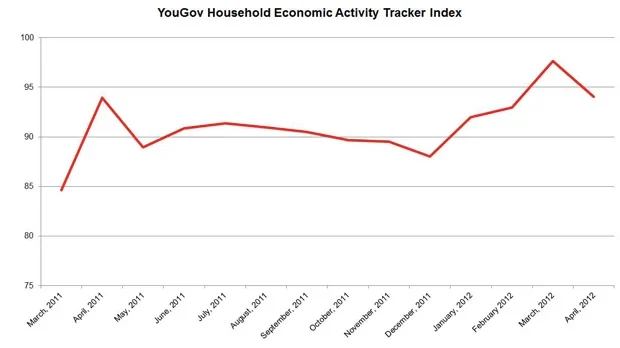Consumer confidence takes a tumble as scores on HEAT index report a sharp drop
- YouGov’s HEAT index reports a four point drop, falling from 98 to 94 - momentum halts but confidence remains higher than in 2011
- Decreases in consumer confidence across all measures and amongst most demographics included on the HEAT index
- Confidence in long-term job security takes a sharp fall, dropping six points from March
- Dramatic decrease in job security score amongst 18 to 34 year olds – falling from 108 to 92
- Drop in confidence in the government’s handling of the economy suggests reception to the Budget could be a driver of the decreases
YouGov’s latest HEAT findings reveal that consumer confidence has taken a tumble with the first half of April’s index score dropping by four points, down from 98 to 94 (see figure 1).
The year started off well on the HEAT index; January saw a significant upturn in consumer confidence with scores increasing off the back of a positive December. February and March cemented the positive start as the index score not only sustained momentum but made steady gains. April’s interim result, however, reveal a ‘not so rosy’ outlook as scores have dropped for the first time in 2012; the only positive news being that they remain higher than at any time in 2011.
Figure 1: UK HEAT Index

Source: YouGov Household Economic Activity Tracker, April 2012
Note: Based on interviews of 3258 UK residents conducted from 1st-15th April.
Index score is derived from consumer sentiment on 4 metrics (home prices, job security, family financial situation, and business activity) measured retrospectively and prospectively.
This month’s negative index score represents a decrease in confidence amongst UK consumers within all measures included in the tracker; personal finance situation, home prices, job security and business activity.
Job security levels amongst employees, both retrospective and prospective, saw decreases of 90 to 87 (retrospective) and 105 to 99 (prospective). Amongst those aged 18 to 34 there was a dramatic decrease in score for prospective job security - down from 108 to 92 – reaching a 12 month low and well below the 12 month average of 102. Business activity levels were also down, though not to the same extent, as scores tumbled from 111 to 107 (retrospective) and 123 to 121 (prospective). April’s prospective score of 121, however, is still substantially higher than in December 2011 - when it fell to a record low of 111.
April’s interim results also reveal that UK consumers share the same sentiment about their household financial situation; scores were down from 80 to 77 (retrospective) and 74 to 70 (prospective). Amongst households earning 50k and over, however, confidence in their household’s financial situation grew as scores saw minor gains from March – up from 91 to 92 (retrospective) and 84 to 87 (prospective).
Consumers are still wary about the state of the UK economy as well as their own financial situation; confidence levels in the government dropped to a record low under the coalition – dropping from 68 to 55. With the drop in confidence, in both the government and the economy, coming off the back of a poorly received budget, this political aspect could be a real driver of the UK consumers’ drop in confidence.
The beginning of the year saw positive gains in all measures, as consumers continued to grow in confidence. However, despite an impressive start, April’s results are an indication of a more fragile situation – a lot more needs to be done - not only to regain consumers’ confidence in the UK economy but also in their own financial situation.
Stephan Shakespeare, CEO of YouGov plc, commented on the findings: “The second best confidence scores in nearly two years might be seen as positive news for some. However, the stalling in momentum seen on the HEAT index and falls from March are disappointing. We will watch these numbers closely to understand if this is just a one-off or if it is the beginning of negative momentum.”
See the full details and original press release for HEAT April 2012 here








